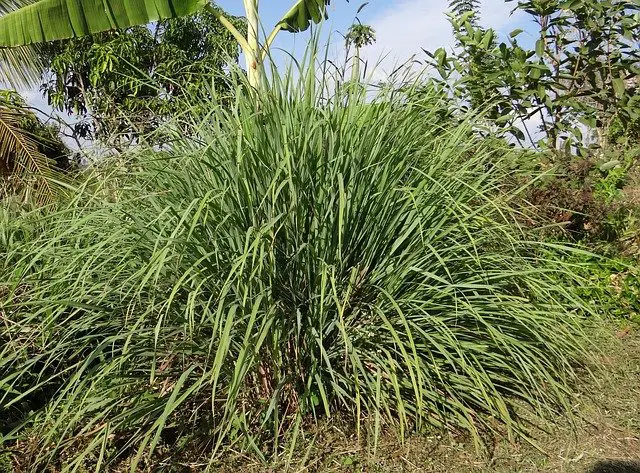What's On This Page
Benefits of Lemongrass Oil
Looking for natural remedies to lift your mood and relieve sadness? Essential oils may be the answer you’ve been looking for. Essential oils have been valued for centuries because of their therapeutic properties and ability to promote emotional well-being. Among the many options available, lemongrass oil is an effective ally against sadness. In this guide, we’ll explore the remarkable benefits of lemongrass oil and how it can help you find comfort and serenity amid life’s challenges. Let’s dive into the refreshing world of lemongrass oil and discover how it can bring sunshine to your days. Are you ready to take advantage of its encouraging benefits?
- Great oil for improving mood and clearing congestion
- It can be used for massages, acne, or as a moisturizer.
- It has antibacterial and anti-fungal properties.
- Improves digestion and reduces cramps/gas

Lemongrass plant
The lemongrass plant, native to Southeast Asia, offers benefits beyond its culinary uses. This prized herb boasts medicinal properties that can soothe digestive issues, alleviate colds and flu, aid wound healing, and manage conditions like sinusitis, eczema, and cancer. Join us as we delve into the diverse healing potential of lemongrass and explore its natural remedies for various ailments. Let’s uncover the world of this versatile herb and discover its incredible therapeutic effects.
Lemongrass oil
Derived from the lemongrass plant’s stalk, lemongrass oil boasts remarkable medicinal properties, particularly its antibacterial actions and ability to alleviate inflammation when applied topically. Join us as we explore the potential of lemongrass oil, uncover its therapeutic qualities, and understand how it contributes to your overall well-being. Let’s dive into the world of this essential oil and discover its exceptional benefits in combating bacteria and reducing inflammation.
Lemongrass leaves
Derived from lemongrass leaves, lemongrass oil is a natural remedy used in aromatherapy to boost alertness and improve mental concentration. Join us as we explore the remarkable benefits of lemongrass leaves, focusing on their ability to enhance alertness and sharpen focus.
How to use lemongrass oil
Discover the many uses of lemongrass oil for various ailments. Here you’ll learn how to use it effectively:
- Skin diseases: Add a few drops of lemongrass oil to a moisturizer or water and gently apply to the affected area. Massage.
- Anxiety relief: Rub a few drops of lemongrass oil on your chest or back.
- Relieve constipation: Put lemongrass oil drops in a diffuser or vaporizer to relieve constipation.
- Soothe muscles and joints: mix lemongrass oil with water or massage oil and gently apply it to sore muscles or joints. Massage the area.
- Support digestion: Drink lemongrass tea or add a drop of lemongrass oil to your food to aid digestion.
- Cold and Flu Relief: Add lemongrass oil drops to water or a drink to relieve cold and flu symptoms.
- Strengthen the immune system: Rub lemongrass oil on your chest to strengthen your immune system.
Remember that lemongrass is often used in Asian dishes such as soups and stews. You can find dried lemongrass in grocery stores or Asian markets. Store it in a dark, cool place away from heat and sunlight.
Cymbopogon citratus
Cymbopogon citratus (also known as lemongrass and citronella) is a tropical plant originating from Indonesia. It is cultivated as an ornamental plant in many warm regions, both indoors and outdoors. As an ornamental plant, it is specially adapted to grow in water sources such as ponds, pots, or water gardens. It can be grown in the same area as other herbs, such as basil, mint, or rosemary.

Blood Pressure
Lemongrass has been used for centuries to combat high blood pressure. In traditional Chinese medicine, it is used to treat blood pressure, headaches, gastrointestinal problems and infections.
Body Odor
The scent of lemongrass oil is potent, and it can serve various purposes. It can be beneficial when applied to the skin or inhaled to address sinus infections and nosebleeds.
Skin
Lemongrass oil is known for its remarkable benefits in skin and hair care. It has properties that can effectively help with problems such as dryness, dandruff, hives, rashes and eczema. In addition, it is very gentle, so it is also suitable for use on irritated skin.
Stomach
Consuming lemongrass tea can relieve common digestive ailments such as nausea, gas, and bloating. Due to its properties, it promotes a healthy stomach and helps with these problems.
Sinusitis
This natural remedy aids in the purification of the sinuses by eliminating harmful bacteria and reducing inflammation, offering relief from sinusitis symptoms.
Effects
Lemongrass oil offers versatile effects when applied topically or inhaled. It possesses calming properties, making it a popular choice in aromatherapy. It offers a delightful lemon flavour and helps relieve symptoms such as nausea, headaches, fever and indigestion. It also serves as a natural mosquito repellent.
Lemongrass is mainly grown in frost-free regions such as South Asia, Australia-New Zealand and South Florida.
Can you ingest lemongrass essential oil?
Oral ingestion of lemongrass essential oil is not recommended. Lemongrass essential oil contains inflammatory monoterpenes, and studies indicate that it may be highly toxic if ingested orally by humans.
Can I add lemongrass essential oil to my water for a drink?
There is limited information on the effects of lemongrass essential oil when consumed in water as a beverage. Further research is needed to understand the possible interactions during digestion.
Does lemongrass kill viruses?
While lemongrass oil and plant have shown some efficacy against certain types of viruses, it should be noted that most viruses are highly resistant to them. Although there is limited evidence of its antiviral properties, caution is advised as certain viruses may still resist lemongrass oil.
Does lemongrass essential oil contain any carcinogenic toxins?
Preliminary studies indicate that the oils contained in lemongrass do not cause cancer in laboratory animals. However, further studies are needed to understand the potential effects on humans better and determine if lemongrass essential oil contains carcinogenic toxins.
How do you use lemongrass leaves for hair growth?
Lemongrass is known to promote the growth of thicker hair. If you have thin hair, you can improve its strength and appearance by adding a few drops of lemongrass oil to your shampoo or conditioner.
How do you use lemongrass essential oil with water in vaporizers?
Add a few drops of the oil to the water container to use lemongrass essential oil with water in a vaporiser. Then inhale the vapour produced by the vaporizer, which can help with congestion, sinus infections, and coughs.
Do lemongrass plants have any side effects?
Lemongrass plants can potentially cause skin irritation, especially if they come into contact with the eyes. It should also be noted that lemongrass can be toxic to cats and dogs if they swallow large amounts of it or have consumed another animal that has ingested the plant. In addition, lemongrass essential oil can affect the human nervous system.
What bugs does lemongrass attract?
Lemongrass has a tendency to attract fire ants, carpenter ants, and various other invasive insects. This characteristic makes it a desirable plant to grow around houses for several reasons.
What bugs does lemongrass repel?
Lemongrass can repel Asian ladybugs and black aphids. Its repellent properties act through physical contact with the insects, causing their discomfort or disease.
Is Lemongrass essential oil good for sleep?
Using a few drops of lemongrass essential oil in a vaporizer with hot water can help promote better sleep and facilitate falling asleep.
Is lemongrass good for the skin?
Lemongrass offers numerous benefits for the skin. It has anti-inflammatory properties that make it useful for soothing sunburns. It can also be used as a toner or moisturizer to keep the skin healthy. It’s worth noting that lemongrass is also an edible plant.
Is Lemongrass essential oil safe for pets?
Using lemongrass essential oil on pets or in areas where pets may come in contact, such as dog runs, is not recommended.
What is a good lemongrass essential oil recipe?
A recommended recipe for lemongrass essential oil is to add a few drops to your shampoo to revive and refresh greasy hair. Also, as mentioned above, you can promote the health of your respiratory system by adding this oil to a vaporizer.
What does lemongrass taste like?
Lemongrass has a flavour and aroma reminiscent of lemon peel. Its flavour profile is a delightful blend of tropical notes that combines sweet and bitter elements.
Is lemongrass oil safe for cats?
No, lemongrass oil is not safe for cats. It can be toxic to cats if ingested or applied to their skin. It is important to keep lemongrass oil out of cats’ reach and not use it on or near them.
List of Studies and sources
http://www.academia.edu/1889771/Lemongrass_oil
https://www.ncbi.nlm.nih.gov/pubmed/15988520
https://www.gardeningknowhow.com/edible/herbs/lemongrass/lemongrass-plant-care.
Leave a Reply